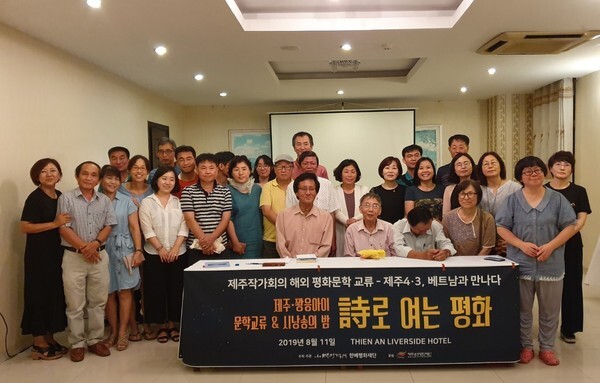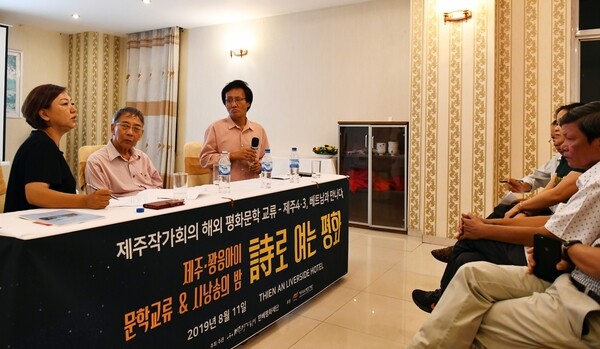hankyoreh
Links to other country sites 다른 나라 사이트 링크
[Interview] “Nurture the seeds of peace while healing the suffering from Vietnam War massacres”

“My friend.”
Thanh Thao, a 73-year-old regarded as one of Vietnam’s greatest poets, had this to say on Aug. 11 about Lee Jong-hyeong, the 64-year-old president of the Jeju Writers’ Association. His remarks came during the evening of a “Jeju-Quang Ngai Poetry Recital Night” event held in the central Vietnamese city of Quang Ngai. It was a fitting appellation for Thanh, who received a “Best Writer” award from the Vietnam Writers’ Association for his 1979 poetry collection “The Footprints Passing a Meadow,” to give to another poet who won last year’s May 18 Literature Award with his own collection “Names That Have Passed Before the Flowers.”
But there was something more to the words “my friend” – something that transcended a personal bond between two poets. It also expressed the hope that Vietnam, which experienced civilian massacres by South Korean troops in the late 1960s during the Vietnam War, and Vietnam, which sent forces to fight in the conflict, might put their suffering behind them to become friends.
Undoing the taboo of discussing S. Korean troops’ civilian massacres during Vietnam War
The issue of civilian massacres by South Korean forces in Vietnam remains more or less a taboo topic in South Korea. The matter first reached awareness through courageous reporting in 1999 by Ku Su-jeong, a Hankyoreh 21 correspondent who now serves as executive director of the Korea-Vietnam Peace Foundation – but it has yet to even be investigated at the government level. Based on her on-site investigations, Ku estimated the scale of casualties at “around 9,000 people killed at civilian massacres by South Korean troops in some 80 villages during the Vietnam War.”
Since then, Ku has been the focal point of a campaign of apology and reconciliation by members of the public through “Vietnam peace journeys.” The peace journey groups visit the sites of massacres in central Vietnam to hold memorial ceremonies and provide scholarships to children in the villages where massacres occurred. But the issue of civilian massacres by troops in Vietnam has yet to receive major attention in South Korea.
Over the course of exchanges with Thanh dating back to 2008, Lee proposed efforts to make headway toward reconciliation on the issue. It all started in the summer of 2008 when he met the Vietnamese poet Chim Trang (1938–2011), who was attending an international literature event in Seoul.
“Chim Trang had come to Jeju Island, it was through him that I learned to my great shock about the ‘monuments of hate’ toward the South Korean troops’ massacres in Quang Ngai Province,” Lee said.
In December of that year, Lee and fellow poet Kim Su-yeol visited Vietnam, where Lee was introduced by Chim Trang to Thanh, a Quang Ngai native. A war correspondent during the Vietnam War, Thanh has continued to work in his home province of Quang Ngai since Vietnam’s unification in 1975.
That meeting marked the beginning of a series of literary exchanges between Jeju and Quang Ngai, centering on Lee and Thanh. The latest Jeju-Quang Ngai Poetry Recital Night was the eighth to date, with a total of 15 poets from the Korean Writers’ Association and five poets from the Quang Ngai Writers’ Association participating.
Poetry to heal the wounds of the Jeju Massacre
In their past exchanges, Thanh wrote poetry addressing the suffering of the Jeju April 3 incident (Jeju Massacre) including a work titled “The Jeju Requiem Ritual Shaman,” while Lee published the words “Eye and Hand” and “Khai Khai Khai” on the Vietnam massacres. In 2015, a joint Jeju-Quang Ngai poetry collection titled “Some Dream During the Day” was published.
Jeju-area poets are also taking part in various exchange programs during their Vietnam visits and visiting massacre sites in places such as Binh Hoa, Quang Ngai Province, and Phong Nhi/Phong Nhat, Quang Nam Province, to hold commemorate events for the victims. Lee, who became president of the Jeju Writers’ Association early last year, had previously spearheaded the exchange effort as the association’s secretary-general and as secretary-general of the Jeju Literature House.
Strengthening the bond between S. Korea and Vietnam through literature
Can efforts like these make friends of South Koreans and the Vietnamese? Lee says they can. Literature has long played a role in exposing hidden falsehoods and healing suffering. Even the events of Jeju Massacre, which authorities long sought to conceal, finally became known to the South Korean public after author Hyun Ki-young’s 1978 publication of the novella “Uncle Suni” in the Changbi Quarterly.
Lee also believes the efforts of Jeju and Quang Ngai poets can plant the seeds for reconciliation and peace. To begin with, he predicted that “people in South Korea and Vietnam will develop a more serious perspective on the tragedies that have taken place in wartime through writer exchanges between the two countries.”
By emphasizing that the Vietnam War massacres represent a global issue caused by 20th century barbarism rather than a matter of one isolated region, he believes it is possible to nurture a mature sense of civic consciousness.
“When sublimated into poetry, the suffering of the massacres can be an impetus for transcending ‘victims’ and ‘victimizers,’ healing each other and opening up our hearts,” Lee said.
At the moment, South Korea and Japan are engaged in economic warfare over historical issues. To be sure, the South Korea-Vietnam situation is a different beast. First and foremost, Vietnam has focused on economic development, advocating an approach of “closing the door to the past and moving into the future.” But Vietnam may also seek to reopen the door to the past in the near future once its economic growth is firmly on track. As Lee puts it, “When there has been no healing of wounds, the door to the past cannot be closed simply because the administration wants it closed.”
Could South Korea-Vietnam relations then be different from South Korea-Japan relations today? The future is impossible to predict. One thing is clear, though: the seeds of peace and friendship currently being planted by poets on both sides continue growing even now.

By Kim Bo-geun, senior staff writer
Please direct comments or questions to [english@hani.co.kr]

Editorial・opinion
![[Editorial] Penalties for airing allegations against Korea’s first lady endanger free press [Editorial] Penalties for airing allegations against Korea’s first lady endanger free press](https://flexible.img.hani.co.kr/flexible/normal/500/300/imgdb/original/2024/0502/1817146398095106.jpg) [Editorial] Penalties for airing allegations against Korea’s first lady endanger free press
[Editorial] Penalties for airing allegations against Korea’s first lady endanger free press![[Editorial] Yoon must halt procurement of SM-3 interceptor missiles [Editorial] Yoon must halt procurement of SM-3 interceptor missiles](https://flexible.img.hani.co.kr/flexible/normal/500/300/imgdb/child/2024/0501/17145495551605_1717145495195344.jpg) [Editorial] Yoon must halt procurement of SM-3 interceptor missiles
[Editorial] Yoon must halt procurement of SM-3 interceptor missiles- [Guest essay] Maybe Korea’s rapid population decline is an opportunity, not a crisis
- [Column] Can Yoon steer diplomacy with Russia, China back on track?
- [Column] Season 2 of special prosecutor probe may be coming to Korea soon
- [Column] Park Geun-hye déjà vu in Yoon Suk-yeol
- [Editorial] New weight of N. Korea’s nuclear threats makes dialogue all the more urgent
- [Guest essay] The real reason Korea’s new right wants to dub Rhee a founding father
- [Column] ‘Choson’: Is it time we start referring to N. Korea in its own terms?
- [Editorial] Japan’s rewriting of history with Korea has gone too far
Most viewed articles
- 160% of young Koreans see no need to have kids after marriage
- 2Presidential office warns of veto in response to opposition passing special counsel probe act
- 3Months and months of overdue wages are pushing migrant workers in Korea into debt
- 4[Editorial] Penalties for airing allegations against Korea’s first lady endanger free press
- 5Japan says it’s not pressuring Naver to sell Line, but Korean insiders say otherwise
- 630th anniversary Wednesday Demonstration pushed out of memorial site by far-right
- 7Dermatology, plastic surgery drove record medical tourism to Korea in 2023
- 8[Reporter’s notebook] In Min’s world, she’s the artist — and NewJeans is her art
- 9OECD upgrades Korea’s growth forecast from 2.2% to 2.6%
- 10Inside the law for a special counsel probe over a Korean Marine’s death